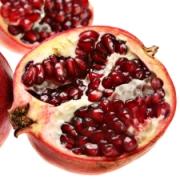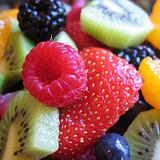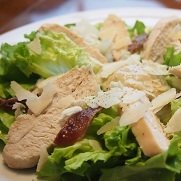Pomegranate Nutrition Facts,
Health Benefits of Pomegranates
All about pomegranate nutrition information, pomegranate health benefits, pomegranate juice benefits, calories in a pomegranate
There’s no doubt that eating a pomegranate requires some effort, as you’ll probably dispose of nearly half the fruit, but it’s definitely worthwhile. Pomegranate means ‘many-grained apple’ and originates from Persia. The fruit is a similar size to a large apple, with a reddish-brown color. Inside it’s full of hundreds of little red capsules called arils that are buried inside a white pulp. The tricky part is separating the sweet tasting arils so you can eat them.
There are 83 calories in one serving (100g or 3.5oz) with no cholesterol and very little fat, so perfect for a snack. The pomegranate provides a good source of vitamin B9 (folate), C and K, along with modest amounts of other vitamins and minerals.
Research has shown that if the juice is regularly consumed, it should result in both lower blood pressure and cholesterol levels, which in turn reduces the risk of heart disease. This is because they contain a tannin called punicalagin. Pomegranates are thought to help the production of red blood cells, destroy worms and may protect against some forms of cancer. They contain the highest antioxidant capacity of all juice.
When purchasing this fruit, ensure the skin looks fresh and tight and not wrinkly. Choose one that looks plump and feels heavy.
Compare pomegranate nutrition facts to the other fruits.
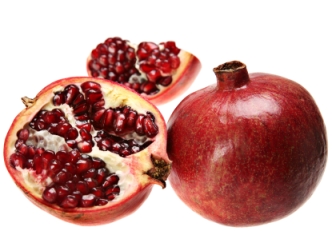
Pomegranate Nutrition Information
| Pomegranate nutritional value per 100 g (3.5 oz) | ||
|---|---|---|
| Proximates: | ||
| Nutrients | Pomegranates, raw Refuse: 44% (Skin and membrane) Scientific Name: Punica granatum | Pomegranate juice, bottled |
| Water | 77.93 g | 85.95 g |
| Energy | 346 kJ (83 kcal) | 228 kJ (54 kcal) |
| Protein | 1.67 g | 0.15 g |
| Carbohydrates | 18.70 g | 13.13 g |
| Total Fat: | 1.17 g | 0.29 g |
| Fiber | 4.0 g | 0.1 g |
| Cholesterol | 0 mg | 0 mg |
| Minerals: | ||
| Calcium, Ca | 10 mg (1 %) | 11 mg (1%) |
| Iron, Fe | 0.30 mg (2 %) | 0.10 mg (1%) |
| Magnesium, Mg | 12 mg (3 %) | 7 mg (2%) |
| Phosphorus, P | 36 mg (4 %) | 11 mg (12%) |
| Potassium, K | 236 mg (5 %) | 214 mg (6%) |
| Sodium, Na | 3 mg (0.13 %) | 9 mg (0%) |
| Zinc, Zn | 0.35 mg (2 %) | 0.09 mg (1%) |
| Copper, Cu | 0.158 mg (8 %) | 0.021 mg (1%) |
| Manganese, Mn | 0.119 mg (6 %) | 0.095 mg (5%) |
| Selenium, Se | 0.5 mcg (0.7 %) | 0.3 mcg (0%) |
| Vitamins: | ||
| Vitamin C | 10.2 mg (17 %) | 0.1 mg (0%) |
| Thiamine (Vit. B1) | 0.067 mg (4 %) | 0.015 mg (1%) |
| Riboflavin (Vit. B2) | 0.053 mg (3 %) | 0.015 mg (1%) |
| Niacin (Vit. B3) | 0.293 mg (1 %) | 0.233 mg (1%) |
| Pantothenic acid (B5) | 0.377 mg (4 %) | 0.285 mg (3%) |
| Vitamin B6 | 0.075 mg (4 %) | 0.040 mg (2%) |
| Folate (Vit. B9) | 38 mcg (10 %) | 24 mcg (6%) |
| Vitamin E | 0.60 mg (3 %) | 0.38 mg (2%) |
| Vitamin K | 16.4 mcg (21 %) | 10.4 mcg (13%) |
| Percentages are relative to US Recommended Daily Intake (RDI) for adults. | ||
Author: Lana Soko
You Might Also Like:
Like This Page?
|
Share This Page:
|
Search Our Site:

Free E-Book:
We Recommend:
Looking to get your body into great shape? Get the very best results for your efforts and money! Save your valuable time from surfing the internet. These are theBestselling Weight Loss Programs
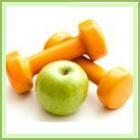
Programs that work and have thousands of satisfied customers worldwide!

 |
